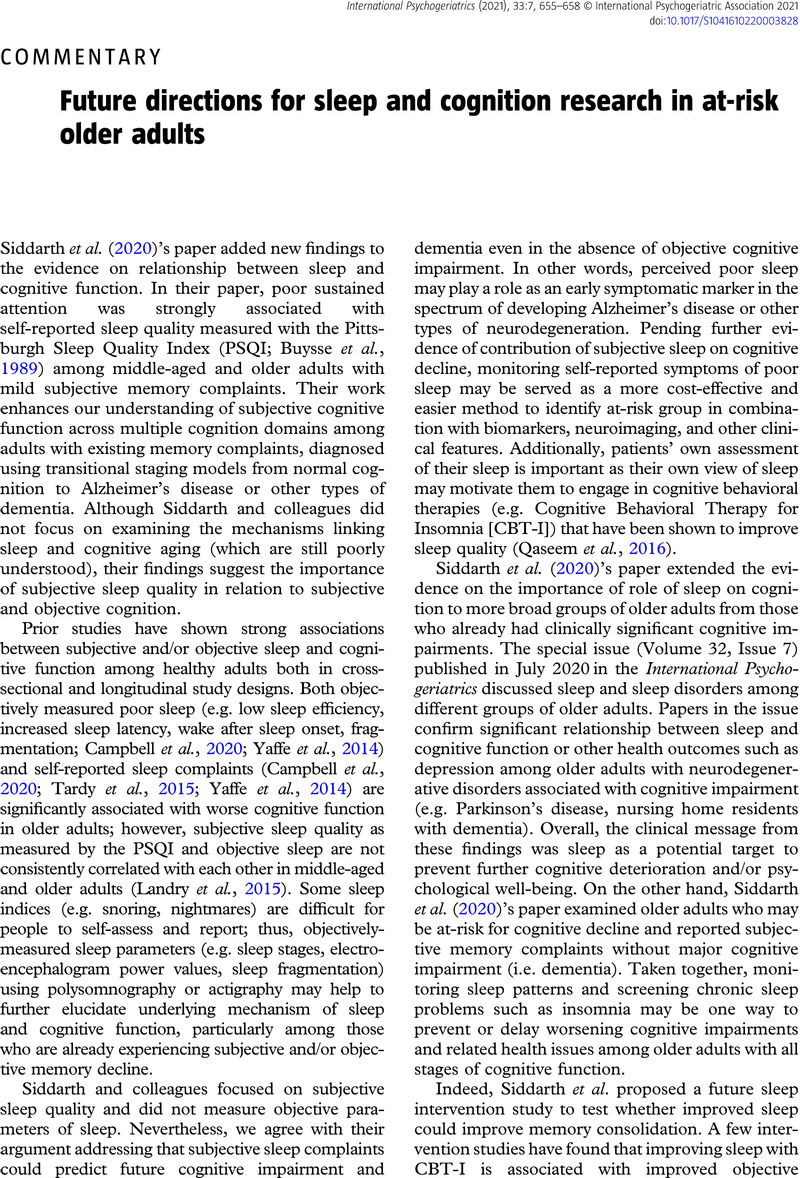No CrossRef data available.
Article contents
Future directions for sleep and cognition research in at-risk older adults
Published online by Cambridge University Press: 03 June 2021
Abstract
An abstract is not available for this content so a preview has been provided. Please use the Get access link above for information on how to access this content.

- Type
- Commentary
- Information
- International Psychogeriatrics , Volume 33 , Special Issue 7: Issue Theme: Cognitive Aging: Subjective and Objective , July 2021 , pp. 655 - 658
- Copyright
- © International Psychogeriatric Association 2021
References
Bangen, K. J. et al. (2019). Cognitive dispersion is a sensitive marker for early neurodegenerative changes and functional decline in nondemented older adults. Neuropsychology, 33, 599–608.CrossRefGoogle ScholarPubMed
Brown, E. E., Kumar, S., Rajji, T. K., Pollock, B. G. and Mulsant, B. H. (2020). Anticipating and mitigating the impact of the COVID-19 pandemic on Alzheimer’s disease and related dementias. American Journal of Geriatric Psychiatry, 28, 712–721.CrossRefGoogle ScholarPubMed
Buysse, D. J., Reynolds, C. F. III, Monk, T. H., Berman, S. R. and Kupfer, D. J. (1989). The Pittsburgh Sleep Quality Index: a new instrument for psychiatric practice and research. Psychiatry Research, 28, 193–213.CrossRefGoogle ScholarPubMed
Campbell, L. M. et al. (2020). Objective and subjective sleep quality measures are associated with different cognitive domains in middle-aged and older adults with and without HIV. The Clinical Neuropsychologist (Epub ahead of print).CrossRefGoogle Scholar
Cassidy-Eagle, E., Siebern, A., Unti, L., Glassman, J. and O’Hara, R. (2018). Neuropsychological functioning in older adults with mild cognitive impairment and insomnia randomized to CBT-I or control group. Clinical Gerontologist, 41, 136–144.CrossRefGoogle ScholarPubMed
Chen, R., et al. (2019). Developing measures of cognitive impairment in the real world from consumer-grade multimodal sensor streams. In: KDD ’19: Proceedings of the 25th ACM SIGKDD International Conference on Knowledge Discovery & Data Mining (pp. 2145–2155). New York: Association for Computing Machinery.Google Scholar
Chung, F., Abdullah, H. R. and Liao, P. (2016). STOP-Bang Questionnaire: a practical approach to screen for obstructive sleep apnea. Chest, 149, 631-638.CrossRefGoogle ScholarPubMed
de Vugt, M. E. et al. (2006). Cognitive functioning in spousal caregivers of dementia patients: findings from the prospective MAASBED study. Age and Ageing, 35, 160–166.CrossRefGoogle ScholarPubMed
Ettman, C. K., Abdalla, S. M., Cohen, G. H., Sampson, L., Vivier, P. M. and Galea, S. (2020). Prevalence of depression symptoms in US adults before and during the COVID-19 pandemic. JAMA Network Open, 3, e2019686.CrossRefGoogle ScholarPubMed
Herbert, V., Kyle, S. D. and Pratt, D. (2018). Does cognitive behavioural therapy for insomnia improve cognitive performance? A systematic review and narrative synthesis. Sleep Medicine Reviews, 39, 37–51.CrossRefGoogle ScholarPubMed
Landry, G. J., Best, J. R. and Liu-Ambrose, T. (2015). Measuring sleep quality in older adults: a comparison using subjective and objective methods. Frontier Aging Neuroscience, 7, 166.Google ScholarPubMed
Lenze, E. J., Rodebaugh, T. L. and Nicol, G. E. (2020). A framework for advancing precision medicine in clinical trials for mental disorders. JAMA Psychiatry, 77, 663–664.CrossRefGoogle ScholarPubMed
Mausbach, B. T., Patterson, T. L., Rabinowitz, Y. G., Grant, I. and Schulz, R. (2007). Depression and distress predict time to cardiovascular disease in dementia caregivers. Health Psychology, 26, 539–544.CrossRefGoogle ScholarPubMed
Moore, R. C., Swendsen, J. and Depp, C. A. (2017). Applications for self-administered mobile cognitive assessments in clinical research: a systematic review. International Journal of Methods in Psychiatric Research, 26, e1562.CrossRefGoogle ScholarPubMed
Qaseem, A., Kansagara, D., Forciea, M. A., Cooke, M. and Denberg, T. D. (2016). Management of chronic insomnia disorder in adults: a clinical practice guideline from the American college of physicians. Annals of Internal Medicine, 165, 125–133.CrossRefGoogle ScholarPubMed
Siddarth, P. et al. (2020). Sleep quality, neurocognitive performance, and memory self-appraisal in middle-aged and older adults with memory complaints. International Psychogeriatrics. doi: 10.1017/S1041610220003324
CrossRefGoogle Scholar
Slavish, D. C., Taylor, D. J. and Lichstein, K. L. (2019). Intraindividual variability in sleep and comorbid medical and mental health conditions. Sleep, 42, zsz052.CrossRefGoogle Scholar
Stringer, G., et al. (2018). Can you detect early dementia from an email? A proof of principle study of daily computer use to detect cognitive and functional decline. International Journal of Geriatric Psychiatry, 33, 867–874.CrossRefGoogle ScholarPubMed
Tardy, M., Gonthier, R., Barthelemy, J. C., Roche, F. and Crawford-Achour, E. (2015). Subjective sleep and cognitive complaints in 65 year old subjects: a significant association. The PROOF cohort. Journal of Nutrition Health and Aging, 19, 424–430.CrossRefGoogle ScholarPubMed
Vesel, C. et al. (2020). Effects of mood and aging on keystroke dynamics metadata and their diurnal patterns in a large open-science sample: a BiAffect iOS study. Journal of the American Medical Informatics Association, 27, 1007–1018.CrossRefGoogle Scholar
Vitaliano, P. P., Echeverria, D., Yi, J., Phillips, P. E., Young, H. and Siegler, I. C. (2005). Psychophysiological mediators of caregiver stress and differential cognitive decline. Psychology and Aging, 20, 402–411.CrossRefGoogle ScholarPubMed
Yaffe, K., Falvey, C. M. and Hoang, T. (2014). Connections between sleep and cognition in older adults. Lancet Neurology, 13, 1017–1028.CrossRefGoogle ScholarPubMed




